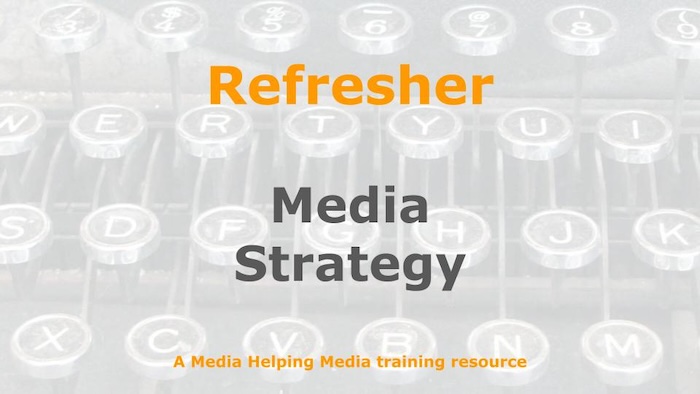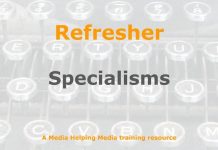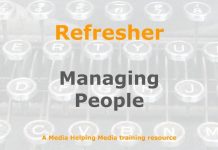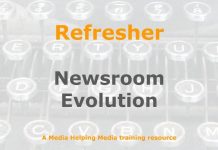 This comprehensive one-day intensive training course is designed to teach media managers how to develop a successful and sustainable strategy for their media businesses.
This comprehensive one-day intensive training course is designed to teach media managers how to develop a successful and sustainable strategy for their media businesses.
Drawing directly from the structured material available in our six-week in-depth Module: Strategic thinking for media managers, this course provides a rapid, comprehensive overview of strategy development, implementation, and adaptation.
Over the day, participants will explore the foundations of strategic planning, audience analysis, content innovation (including the shift to ‘digital first’ and converged newsrooms), and the importance of strong organisational management.
Through focused discussions and practical, group-based exercises, attendees will learn how to define objectives, monitor market trends, lead staff effectively, and manage strategic projects, ensuring they can develop and apply effective media strategies immediately.
The programme is structured into four intensive sessions, balancing foundational strategic principles with practical, actionable steps for organisational success and sustainability.
We recommend that participants read the resources listed below before attending this refresher.
Session 1: Foundations of strategy and audience analysis (09:00 – 10:45)
- Focus: Establishing the initial media business, using research to drive decisions, and rigorously identifying the target audience.
- The four essential initial steps required to set up a media business, including market analysis and business planning.
- Emphasising the critical role of thorough, data-driven research in informing all strategic decisions.
- Identifying and analysing audience demographics, behaviours, and specific information needs across different platforms.
- Group activities:
- Market analysis exercise: Groups define the current market landscape for a chosen media sector (e.g., local news, specialist digital content) and identify a viable market differential.
- Audience profile development: Participants develop a detailed target audience profile for a new media product, specifying their information needs and media consumption habits.
- Recommended session resources:
10:45 – 11:00: Break
Session 2: Content strategy and digital innovation (11:00 – 12:45)
- Focus: Creating market differentiation through original journalism and planning for digital-first newsroom convergence.
- Highlighting the importance of unique and compelling original journalism to build brand loyalty and attract audiences.
- Tracing the evolution of newsrooms from ‘digital denial’ to ‘digital first’ and integrating digital strategies into traditional operations.
- Exploring the concept of converged newsrooms to enhance content delivery across various platforms.
- Group activities:
- Converged workflow design: Groups map out a workflow for a single news story through a converged news operation, defining roles and responsibilities from initial reporting to multi-platform output.
- Innovation strategy: Participants brainstorm ideas for content innovation that would establish a clear market differential for their organisation.
- Recommended session resources:
12:45 – 12:45: Lunch
Session 3: Strategic planning and organisational adaptation (13:45 – 15:30)
- Focus: Creating a comprehensive corporate plan, monitoring market trends, and ensuring core values guide strategy.
- Detailing the process of preparing and introducing a comprehensive corporate plan with defined objectives and monitoring mechanisms.
- Exploring methods for continuously monitoring the market and audience behaviour to ensure organisational adaptability.
- Emphasising the importance of a clear vision, accountability, and transparency in building trust and fostering a positive organisational culture.
- Group activities:
- Corporate plan outline: Groups develop a high-level outline for a corporate plan for a media organisation, including a mission statement, three core strategic objectives, and key performance indicators (kpis).
- Vision and values discussion: Analysing how a media organisation’s vision statement translates into ethical reporting and strategic decision-making.
- Recommended session resources:
15:30 – 15:45: Break
Session 4: People management, projects, and sales strategy (15:45 – 17:30)
- Focus: Effective people management, structured project implementation, and developing revenue-generating sales strategies.
- The importance of investing in staff development and effective leadership to drive organisational success.
- Outlining the skills and techniques required for effective media project management, from concept development to risk management.
- Guidance on developing effective media sales strategies to generate revenue and ensure financial sustainability.
- Group activities:
- Project management initiation: Groups select a strategic initiative (e.g., launching a new podcast) and develop a basic project plan, including key stages and required skills/resources.
- Sales strategy pitch: Participants outline the core elements of a sales strategy for their media product, focusing on identifying potential advertisers and revenue streams.
- Recommended session resources:
- Developing the potential of your staff
- Managing people and setting objectives
- An example of the media project management process
- The skills and techniques of media project management
- Basics of project development for a media organisation
- Lesson – project management
- How to develop a media sales strategy
Course end and wrap-up
Invite participants to discuss what they have learnt from the course.
Related material








